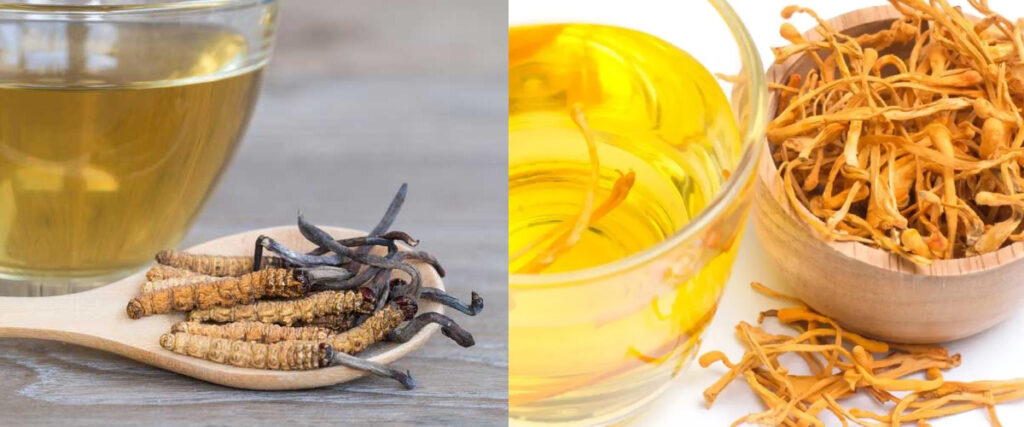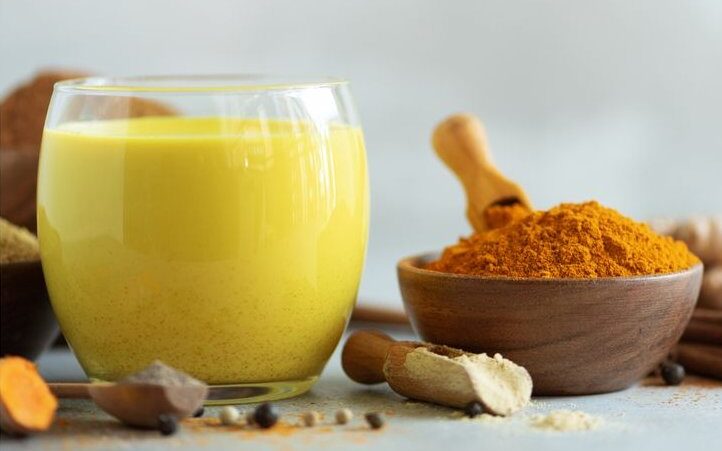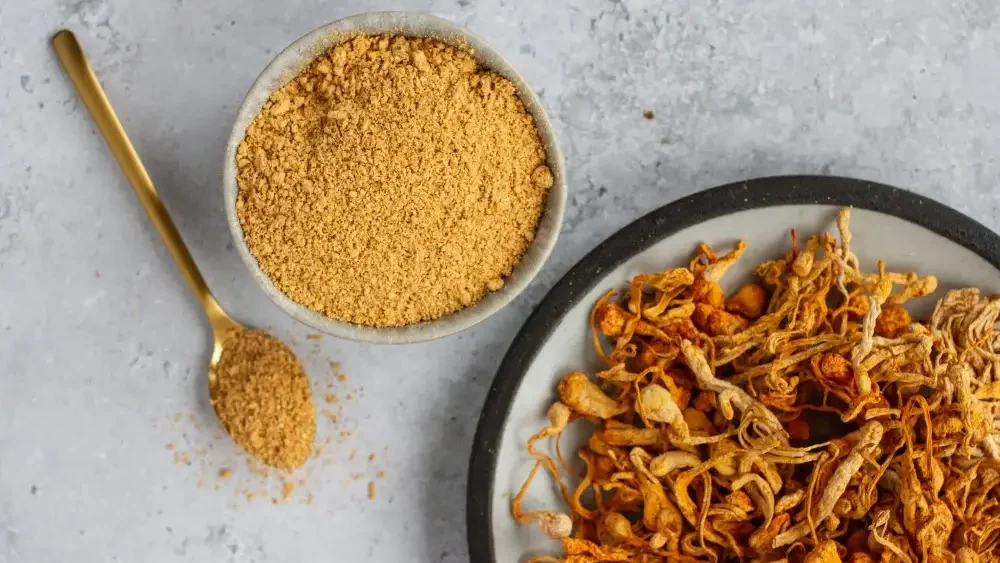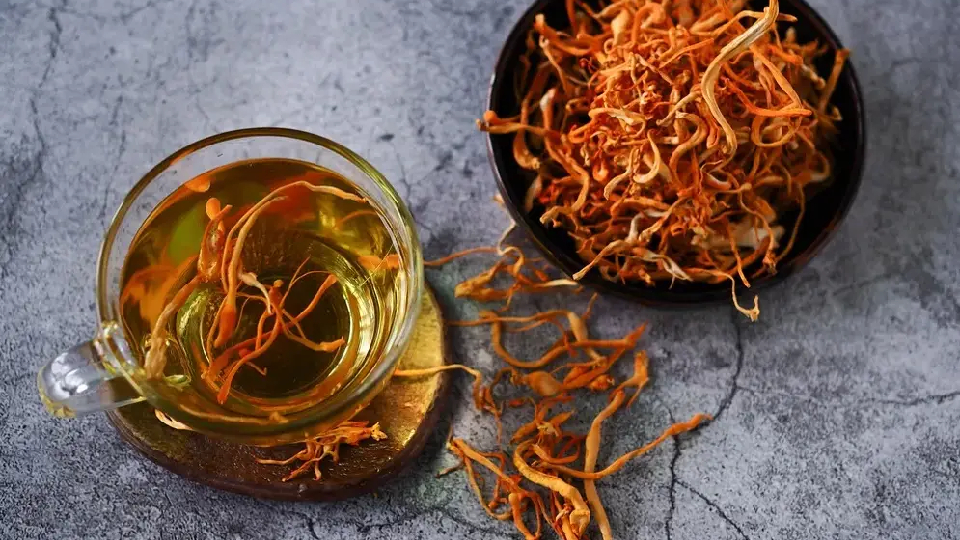How to Make The Best Cordyceps Tea (With Recipe)
Cordyceps tea is derived from the cordyceps fungus found on certain caterpillars in China’s high mountain regions. Traditional Chinese Medicine has long utilized cordyceps to address fatigue, sickness, kidney disease, and low libido. It is believed to offer numerous health benefits, including enhanced exercise performance, strengthened immunity, reduced inflammation, improved heart health, and lowered blood sugar in individuals with type 2 diabetes.
Moreover, cordyceps tea is also thought to boost the body’s production of adenosine triphosphate (ATP), a crucial energy source for muscles. While scientific evidence is limited, cordyceps shows promising potential in promoting overall well-being. So, this article delves into the advantages of cordyceps tea and its applications in Traditional Chinese Medicine.
In this article:
What is Cordyceps Tea?
Cordyceps tea is a type of herbal tea made from the Cordyceps mushroom, which is native to the high-altitude regions of China, Tibet, and Nepal. To make the tea, the Cordyceps mushroom is first dried and then brewed in hot water, creating a flavorful and aromatic infusion.
“Cordyceps mushrooms are a powerhouse of energy and vitality, and have been used for centuries in traditional Chinese medicine[1].”
Dr. Paul Stamets, a mycologist
This mushroom is believed to have a range of health benefits, including boosting energy levels, improving immune function, and reducing inflammation in the body[2].
Additionally, some studies have shown that Cordyceps may be effective in improving respiratory function and reducing the symptoms of asthma.
All in all, for those who are looking for a natural way to improve their health and well-being, Cordyceps tea is definitely worth trying.
Discover the Health Benefits of Cordyceps Mushrooms
How to Prepare Cordyceps Tea?
There are a few ways to prepare cordyceps tea, including using whole mushrooms, powder, and tincture. You can follow some simple steps for each method to make a cup of Cordyceps tea at home.
3 Best Ways to Make Cordyceps Tea
Using Whole Mushrooms
- Rinse the cordyceps mushrooms under cold water to remove any dirt or debris.
- Place the mushrooms in a pot of water and bring to a boil.
- Reduce heat and let the mushrooms simmer for 30-40 minutes, or until the water has turned a golden color.
- Strain the liquid and discard the mushrooms.
- Serve hot and enjoy!
Using Cordyceps Powder
- Add one teaspoon of cordyceps powder to a teapot or infuser.
- Bring water to a boil and pour over the cordyceps powder.
- Let the tea steep for 3-5 minutes.
- Strain the liquid and serve hot.
Using Cordyceps Tincture
- Boil water in a kettle or pot.
- Pour 8-10 ounces of hot water into a mug or teapot.
- Let the tea steep for 3-5 minutes.
- Add 1-2 droppers of Cordyceps tincture to the water.
- Optional: add honey, lemon or any other flavoring of your choice.
- Enjoy your cup of Cordyceps tea with tinctures!
Cordyceps Sinensis Tea vs Cordyceps Militaris Tea

Traditional Chinese medicine has utilized two types of teas for centuries, namely Cordyceps Sinensis and Cordyceps Militaris. These teas have distinct differences in their origin, traditional uses, flavor, and active compounds, and offer potential health benefits.
The table below shows a comparison between Cordyceps Sinensis and Cordyceps Militaris:
| Cordyceps Sinensis Tea | Cordyceps Militaris Tea | |
| Origin | China, Nepal, Tibet | Himalayas |
| Traditional Use | Mostly used for to improve energy levels, boost immunity, treat respiratory problems, reduce fatigue, and improve kidney function | Mostly used boosting energy and immunity, increasing strength and stamina, enhancing mental clarity and focus, improving physical performance, supporting respiratory health |
| Flavor | Mild, earthy, slightly sweet | Slightly sweet, nutty |
| Potential Health Benefits | Boosts Immunity, Supports Lung Health, Improves Stamina and Energy, Enhances Brain Function, Supports Heart Health | Boosts Immune System, Supports Respiratory Health, Enhances Energy and Stamina, Promotes Heart Health, Improves Cognitive Function |
| Active Compounds | Ganoderic acid, Ergosterol, Nucleosides, Polysaccharides, Adenosine. | Cordycepin, Adenosine, Polysaccharides, Ergosterol, Flavonoids |
| Side Effects | Nausea, Diarrhea, Headache, Fatigue, Insomnia | Headache, Nausea, Diarrhea, Dizziness, Fatigue |
| Precautions | Consult with healthcare provider before use, Be sure to purchase from a reputable source | Consult your doctor before consuming, Do not exceed the recommended dosage |
What is Cordyceps Tea Good For?
Cordyceps tea benefits are largely due to its active ingredient, cordycepin, which has been shown to have a wide range of health-promoting properties.
Health Benefits
1. Boosts Energy and Stamina
Cordyceps contains a compound called adenosine, which helps increase the production of ATP (adenosine triphosphate) in the body. ATP is the primary source of energy for our cells, and increasing its production can help boost overall energy and stamina levels[3].
2. Supports Immune System Function
Cordyceps is rich in antioxidants, which help protect the body against free radical damage. Free radicals are harmful molecules that can cause cellular damage and weaken the immune system. By consuming cordyceps regularly, you can help strengthen your immune system and ward off illnesses.

3. Enhances Athletic Performance
Cordyceps has been shown to enhance athletic performance by increasing oxygen uptake, which can lead to improved endurance and faster recovery times. This makes it an excellent supplement for athletes and fitness enthusiasts.
4. Regulates Blood Sugar Levels
Cordyceps contains compounds that help regulate blood sugar levels. This is especially beneficial for people with diabetes or those at risk of developing the condition[4].
5. Reduces Inflammation
Inflammation is a natural response of the body to injury or infection, but chronic inflammation can lead to a host of health problems. Cordyceps contains anti-inflammatory compounds that can help reduce inflammation in the bod.
6. Improves Respiratory Function
Cordyceps tea has been used in traditional Chinese medicine to treat respiratory disorders like asthma and bronchitis. This is because it contains compounds that can help improve lung function and reduce inflammation in the airways[5].
7. Supports Liver and Kidney Function
Cordyceps tea has been shown to have a protective effect on the liver and kidneys. This is because it contains compounds that can help reduce oxidative stress and inflammation in these organs, which can lead to improved function over time[6].
Cordyceps Tea Recipe
Cordyceps Golden Milk Tea Recipe
Making cordyceps golden milk tea is a simple and tasty way to receive the numerous health benefits of Cordyceps mushrooms. This tea is prepared with nutty, earthy cordyceps mushrooms, creamy coconut milk, aromatic spices, and sweet honey.

Ingredients
Instructions
- In a small saucepan, heat the milk over medium heat until it starts to simmer.
- Add the cordyceps powder, turmeric powder, cinnamon powder, and honey, and stir until everything is well combined.
- Allow the mixture to simmer for 3-4 minutes, stirring occasionally.
- Remove the saucepan from heat and strain the mixture into a cup.
- Enjoy your delicious and nutritious Cordyceps golden milk tea!
What Does Cordyceps Do to the Brain?
Cordyceps, a type of fungi, has gained recognition for its potential to benefit the brain. Studies have shown that it can improve cognitive performance, memory, and learning, and may be beneficial for those with neurological disorders like Parkinson’s and Alzheimer’s.
The exact mechanism of action is still being explored, but researchers believe that cordyceps may work through improved mitochondrial function, neurotransmitter release, and antioxidant activity. By balancing different systems in the brain, cordyceps may contribute to a feeling of well-being.
Research also indicates that cordyceps can increase levels of certain neurotransmitters like dopamine, which could be useful for people with depression and other mood disorders. Additionally, cordyceps may have neuroprotective effects on dopaminergic neurons, according to a study published in the Journal of Neuroimmune Pharmacology, making it potentially beneficial for people with neurodegenerative disorders like Parkinson’s.
SUMMARY
Overall, cordyceps has the potential to provide a range of cognitive and neurological benefits, and ongoing research is exploring its mechanisms of action and therapeutic applications.
How Do Cordyceps Make You Feel?

Cordyceps may make you feel more energized, less fatigued, and more alert. It improves oxygen uptake, enhancing endurance and athletic performance. Additionally, it supports respiratory health, promoting clearer breathing and increased vitality. Moreover, this remarkable mushroom enhances immune function, helping you stay strong and resilient.
It may also help improve sleep quality. The anti-inflammatory and antioxidant properties of the mushroom are said to help the body relax, leading to better sleep quality. Some people who have difficulty falling asleep or suffer from insomnia find that taking cordyceps helps them fall asleep and stay asleep.
Lastly, cordyceps are said to have anti-aging effects. The mushroom is believed to help improve skin health, reduce wrinkles, and improve overall complexion. This could lead to a feeling of youthful vitality and a renewed sense of health and well-being.
Side Effects of Cordyceps
Like any other supplement or medication, cordyceps may have side effects that one needs to be aware of.
- Upset stomach
- Headache and dizziness
- Dry mouth
- Skin irritation
- Allergic reaction
NOTE
Although generally safe, it is crucial to be aware of the potential side effects and talk to a doctor before taking any supplements, including cordyceps.
Does Cordyceps Work Immediately?
Natural supplements don’t work immediately, they take time. Cordyceps also doesn’t have immediate effects but becomes more noticeable with regular use over time.
The active compounds in cordyceps work in several ways, including increasing oxygen uptake, boosting endurance, reducing fatigue during exercise, supporting immune system function, reducing inflammation, and improving cardiovascular health.
While the effects on exercise performance may take a few weeks or months to appear, its effects on other aspects of health may be cumulative and visible over time. So, be patient and consistent for the best results.
THE BOTTOM LINE
To reap the maximum benefits of cordyceps, consistent and patient consumption is crucial. Taking it regularly over an extended period is the best way to experience its potential health benefits. However, it’s important to note that its effects may vary from person to person and may take time to manifest.
FAQs
Does Cordyceps Tea Have Caffeine?
Cordyceps Tea does not have caffeine. It is naturally caffeine-free, making it a great choice for those seeking a calming and caffeine-free beverage option. Enjoy its benefits without worrying about caffeine content.
Should I Mix Cordyceps Capsules with Tea?
It’s generally safe to mix Cordyceps capsules with tea. The tea may enhance the absorption of the supplement. However, check the manufacturer’s guidelines and consult a healthcare professional if you have any concerns or specific health conditions before combining supplements with beverages.
How Late Can I Drink Cordyceps Tea?
You can typically drink Cordyceps tea in the late afternoon without interfering with sleep since it contains less caffeine than coffee. However, sensitivity to caffeine varies, so some people may need to avoid it closer to bedtime to ensure a good night’s sleep. Adjust the timing based on your tolerance.
Cordyceps Sinensis Dosage Powder for Tea?
Cordyceps Sinensis dosage powder for tea is recommended at approximately 1 to 3 grams per serving. Start by taking 1 gram and work your way up to 3 grams, depending on how you feel. It is important not to exceed the recommended dosage, as it may cause unwanted side effects.
When Should I Take Cordyceps Tea?
The best time to take Cordyceps Tea is in the morning or during the day. It can provide an energy boost and support overall well-being. Drinking Cordyceps tea can provide a natural energy boost and can help to improve alertness and focus.
Summary
Cordyceps offers a range of health benefits, and there are various enjoyable forms to choose from, such as cordyceps tea, cordyceps powder, cordyceps gummies, cordyceps capsules, and cordyceps tinctures. These different forms share similar effects, including improved energy, boosted immunity, enhanced brain function, increased strength and endurance, reduced fatigue, and better mental clarity and focus. It’s essential to be mindful of potential side effects like insomnia, restlessness, and increased appetite when consuming Cordyceps tea. To reap the benefits, it’s crucial to be patient, as the effects may not be immediate and could take days or weeks to manifest. Nevertheless, when properly prepared and dosed, Cordyceps tea can be a fantastic and beneficial addition to your health routine.
References
1. Stamets, P. (2020, April 7). Cordyceps Mushrooms: A Powerhouse of Energy and Vitality. Retrieved from https://paulstamets.com/
2. Effect of dietary Cordyceps polysaccharide supplementation on intestinal microflora and immune response of Apostichopus japonicus. Retrieved from https://onlinelibrary.wiley.com/doi/10.1111/are.15389
3. Effects of the Mycelial Extract of Cultured Cordyceps Sinensis on In Vivo Hepatic Energy Metabolism in the Mouse. Retrieved from https://www.jstage.jst.go.jp/article/jphs1951/70/1/70_1_85/_article/-char/en
4. Cordyceps cicadae mycelia and its active compound HEA exert beneficial effects on blood glucose in type 2 diabetic db/db mice. Retrieved from https://onlinelibrary.wiley.com/doi/10.1002/jsfa.9221
5. Cordyceps polysaccharide ameliorates airway inflammation in an ovalbumin-induced mouse model of asthma via TGF-β1/Smad signaling pathway. Retrieved from https://www.researchgate.net/publication/339093310_Cordyceps_polysaccharide_ameliorates_airway_inflammation_in_an_ovalbumin-induced_mouse_model_of_asthma_via_TGF-b1Smad_signaling_pathway
6. Optimal conditions for cordycepin production in surface liquid-cultured Cordyceps militaris treated with porcine liver extracts for suppression of oral cancer. Retrieved from https://www.sciencedirect.com/science/article/pii/S1021949817300352

